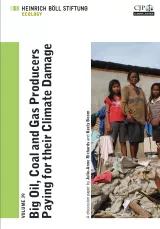Big Oil, Coal and Gas Producers Paying for their Climate Damage
The Climate Justice Programme (CJP) and the Heinrich Böll Foundation are proposing a new and innovative source of finance: a fossil fuel extraction levy paid by those 90 entities responsible for two-thirds of global carbon emissions. The third and updated edition of the Carbon Majors report, now titled "Big Oil, Coal and Gas Producers paying for their Climate Damage" has been published in June 2015.
This discussion paper outlines the case for fossil fuel producers («Big Oil, Coal and Gas Producers» resp. «Carbon Majors») to provide funding via the Warsaw International Mechanism for Loss and Damage for communities suffering loss and damage from climate change.
Billions of people in poor communities are innocent victims in the climate change equation. They are amongst the lowest polluters in the world, yet they are already suffering from loss and damage caused by climate change. Impacts such as drought and changing rainfall patterns in the Sahel region; sea-level rise and coastal erosion in small islands; the double challenge of rising sea levels and severe cyclones in Bangladesh; and the devastating effect of super-Typhoon Haiyan on the Philippines have already gone beyond the ability of communities to adapt. It is expected that loss and damage from climate change will increase dramatically in the poorest parts of the world.
The climate change already being experienced is the result of the emissions that have been released into the atmosphere since the start of the Industrial Revolution. A groundbreaking report released in 2013, the Carbon Majors report, established that 63% of carbon emissions in the atmosphere have come from the coal, oil, and gas extracted and cement manufactured by only 90 entities – the «Big Oil, Coal and Gas Producers», which include Chevron, ExxonMobil, Saudi Aramco, BP, Gazprom, and Shell. In 2014, Richard Heede updated his results to find that 65% of historic carbon emissions could be attributed to these entities. These entities have made massive profits from extracting and selling the fossil fuels that cause climate change without paying for any of the damage from climate change that their products are causing. To safeguard the climate for all of us, we must phase out fossil fuels. In the meantime, these entities have a moral and legal responsibility to provide redress for the loss and damage arising from the emissions their products have caused. Adding a levy to the extraction of fossil fuels can help meet these goals.
The international community has taken initial steps to address loss and damage from climate change. In November 2013 the United Nations Framework Convention on Climate Change (UNFCCC) agreed to establish the Warsaw International Mechanism for Loss and Damage to: enhance knowledge and understanding of comprehensive risk-management approaches to address loss and damage; strengthen dialogue, coordination, coherence, and synergies; and enhance action and support, including technical support and mobilising finance.
These functions of the International Mechanism for Loss and Damage will clearly require funding. Unfortunately, the current level of climate finance under discussion by the international community is grossly inadequate for mitigation and adaptation efforts, without taking loss and damage into consideration. Therefore, a new source of finance is needed.
This paper proposes that these major polluting companies pay a levy – based on their emissions to date and on future extraction of fossil fuels – to the International Mechanism for Loss and Damage to provide funding to the poorest and most vulnerable communities suffering the worst impacts of climate change, as outlined in the graphic below.
This approach is based on the «no harm» principle in international law and the principles of transboundary harm. It is consistent with the UNFCCC and is informed by precedents from other fields developed in line with the Rio Declaration on Environment and Development (1992), including the oil spill compensation regime, the nuclear damage regime, and the biosafety regime. This proposal has many advantages including: providing a new and predictable source of finance for the most vulnerable countries and communities; adding cost to the extraction and use of fossil fuels, and thereby discouraging their use; ensuring that the entities whose products are responsible for causing climate change – the big fossil fuel-extracting entities – meet the costs of loss and damage inflicted on the poorest and most vulnerable; and being consistent with international law, precedents from other areas, and compatible with existing national systems such as emissions trading schemes, levies, royalties, etc.
Product details
Table of contents
Executive summary 11
1. Introduction 13
2. Who and what are the Big Oil, Coal and Gas Producers? 15
3. What is loss and damage? 21
3.1 Scale of loss and damage 23
4. Legal responsibility for loss and damage 27
4.1 Legal responsibility (liability) for loss and damage under international law 27
4.2 Legal responsibility (liability) for loss and damage under national, transnational, and supranational law 30
4.3 Precedents from other fields 32
4.3.1 Oil spill compensation 33
4.3.2 Nuclear damage regime 35
4.3.3 Biosafety liability 35
5. How might the UN loss and damage mechanism work? 37
5.1 History of the UN loss and damage negotiations 37
5.2 What will the Warsaw International Mechanism for Loss and Damage do? 39
5.3 Why do we need loss and damage finance? 41
6. How Big Oil, Coal and Gas Producers could help fund loss and damage 45
6.1 Key considerations 48
6.1.1 Fossil fuel phase-out 48
6.1.2 Why focus on Big Oil, Coal and Gas Producers? 49
6.1.3 Differentiation between developed and developing countries 50
6.1.4 When to begin historical responsibility? 52
6.1.5 What should the levies be set at? 52
6.1.6 Interaction with other climate change programmes 54
6.1.7 Opportunities to progress within the UNFCCC 54
7. Next steps including further areas of research and discussion 55
Bibliography and resources 57
Abbreviations 63
